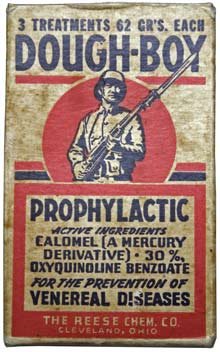A Call to Arms of Another Kind: 1918, A Banner Year for the Condom
I'm writing about culture for #explore1918 (see my prior entry about Edith Wharton's "propaganda novel"). In honor of Valentine's Day, and in a thematically-compatible spirit as my colleague @engledd's entertaining write-up on the WWI origin of commercially-marketed sanitary pads, I bring you a short entry on the humble condom.
Confronting an Age-Old Problem
Let me take you back to 1918, when World War I camp hospitals overflowed with soldier-patients suffering from battle wounds, influenza, and… gonorrhea. Long before the use of penicillin, venereal diseases weren’t easy to treat and they were a major public health risk, both on and off the battlefield. They also impaired the efficiency of military action; the U.S. Army discharged over 10,000 men for infection with sexually transmitted diseases during World War I, and deferred many more draftees before they even joined up. [1]
Post-1918 Change in Policy

Although German, French, and British troops in the War had been issued sheath prophylactics- condoms- in their kits as a matter of course, the U.S. had waffled on the policy, worried about the moral implications of such an action. Instead, they urged “restraint.” Only in 1918, faced with an enormous loss of manpower, did U.S. military policy change, allowing the distribution of condoms among servicemen as a disease preventative measure.

A Doughboy Prophylactic kit with bracing mercury tincture. Source
It took a little while for condom sales to take off back home, but by 1965, apparently 42% of Americans seeking contraception relied on this type of prophylaxis.[3] But it’s important to note that these statistics and policies were compiled with only one type of sexual activity in mind: that of the heteronormative, penetrative variety, preferably between married people. They do not, did not, and never will tell the full story of American sexual experience or contraceptive effort (whether against sexually transmitted disease, pregnancy, or both).
100% of the SBD rewards from this #explore1918 post will support the Philadelphia History Initiative @phillyhistory. This crypto-experiment conducted by graduate courses at Temple University's Center for Public History and MLA Program, is exploring history and empowering education. Click here to learn more.
Works Cited
1. Rasnake, Maj Mark S. “History of U.S. Military Contributions to the Study of Sexually Transmitted Diseases.” Military Medicine 170:4 (2005), 61-65.
2. Keys, E.L. Jr. “The Management of Venereal Diseases by the United States War Department during the Past Two Years.” The Public Health Journal 10:6 (June 1919), 253-261.
3. “Virtue, Vice, and Contraband: A History of Contraception in America.” Case Western Reserve University Dittrick Medical History Center. Online exhibition. http://case.edu/affil/skuyhistcontraception/index.html
Really like your little intro paragraph with references to other posts. I'm going to copy that convention!
Great post. I hadn't thought that the military use of the word "discharged" could have so many meanings. (Sorry!)
"In honor of Valentine's day." Hah!
Condoms are something that I take for granted due to a number of privileged reasons (aaaaaand my queerness), so it's good to be reminded that very recently access was a lot more difficult. Also makes me think about how many forms of contraception and STI protection are still inaccessible to many.
You're right! And the political implications of who they are available to, and when and how, are really disturbing. I think you would have enjoyed the job talk by Chelsea Schields on Tuesday (or were you there and I missed you?). She ties a lot of these strings together in her research